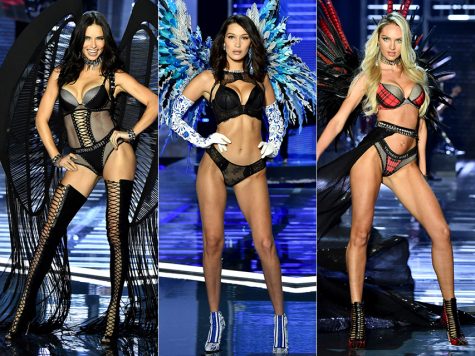Op-ed: Why fat is not a bad word
October 21, 2019
Fat. The scary f-word to society’s beauty standards.
Much too often, people associate the word fat with ugliness, being unlovable, worthlessness, and a feeling of disgust. On social media, I constantly hear phrases like, “Ugh, I feel so fat today,” “I can’t believe I ate like a fatty today,” or “Do I look fat?” and almost every time these phrases are said by non-fat people.
So, what do non-fat people get out of calling themselves fat by associating the word with ugliness or disgusting? Nothing.
Just because a person feels fat, doesn’t mean they are fat. It’s one or the other, either a person is fat or they are not. Fat isn’t a feeling to be self-deprecating, it’s just a description of a body. It does not make sense to say fat like it’s an emotion.
Implying the word is something negative and undesirable can be harmful to actual fat bodies.
It just continues to create more fatphobia. For instance, the more people have believe the stigma that being fat is the worst thing someone could be, then the discrimination toward fat bodies will never change and eating disorders will continue to happen.
According to Dr. A. Janet Tomiyama, from the Health Psychology Area of the Department of Psychology at UCLA, “weight stigma is defined as the social devaluation and denigration of people perceived to carry excess weight and leads to prejudice, negative stereotyping and discrimination toward those people.”
Nothing good comes from a bias towards fat bodies.
Society’s culture is obsessed with thinness. There’s proof all over the media and in advertisements. Thin bodies have always been seen as beautiful, healthy, and desirable for the last half a century while having fat is viewed as shameful, which is why thin privilege exists.
It’s important to know why thin privilege is still real even if a skinny person has been shamed for their body type. A person does not have to feel thin to have thin privilege. Just like fat isn’t a feeling, skinny isn’t either. If someone is thin, then they are thin.
Remember that thin privilege doesn’t mean life is easy, it means that thinness is not targeted as societal discrimination and prejudice. Despite if a skinny person has ever been bullied for being thin, felt disgusted or uncomfortable with their own body, or has body dysmorphia, they are not dealing with the same level of prejudice as fat people do almost daily.
When it comes to fat-shaming and skinny shaming, there’s a huge difference between the two. The differences fall in a set of systemic power dynamics.
Most fat bodies are harassed and shamed for eating, shopping, simply just existing, and even going to the doctor.
Others may argue that thin people face the issue of sometimes not finding clothing and get asked questions like, “Do you even eat?” But that does not equal the same level of oppression.
When a fat person is harassed or shamed for their body, it affects all fat bodies, but when a skinny person is shamed it just affects that person. Yes, to declare, expressing mockery or criticism on any type of body is awful and harmful, but no, skinny shaming is not the same as fat-shaming.
Skinny shaming is not necessarily accurate, because no matter how much criticism they may get, the society around skinny bodies will always be praised. The correct term would be body shaming, which shouldn’t be tolerated either.
Back to the f-word. No matter how people use the word fat, it’ll never be a bad word. So, there is no valid reason to not retrain to respond differently and be able to admit the actual feeling at the moment, instead of saying fat.
Having any type of body is okay, that should include fat bodies, too. The reclamation of a word that usually tries to bring so much shame by others can be so liberating.








